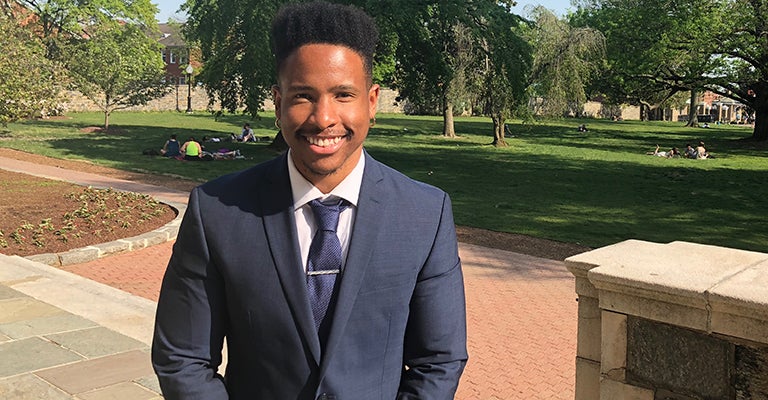Johnson Addresses Deterrence Using Economics
May 17, 2018 — How much is too much to pay for security? One Georgetown graduate student conducted an independent research project that seeks to provide an economics-based answer.
Rich Johnson (G’18), who will graduate this weekend with his master’s degree in applied economics, sought out an independent research project alongside Professor George Akerlof of the Department of Economics and the McCourt School of Public Policy.
Johnson wrote his thesis on deterring agent theory, a way of determining the value of measures that decrease risk.
CHOOSING A PROGRAM
Johnson, an economics major and statistics minor at the University of North Texas, realized late in his undergraduate career that he was interested in further education in economics. But he wasn’t sure exactly what he wanted.
“I knew I wanted to pursue a higher education in economics, and the question was whether I wanted to pursue a master’s or a Ph.D.,” Johnson said. “I knew I loved economics, but I wasn’t sure I was quite ready to devote eight years to a Ph.D.”
Johnson began exploring graduate programs at the recommendation of several of his favorite professors. He found Georgetown’s Department of Economics appealing because of the reputation of its faculty.
“My professors at North Texas recommended I look at the professors at individual schools and see if I admire the work they do — if they conduct research that I really liked,” he said.
The fall following his graduation, Johnson began working full-time in Washington, D.C. while pursuing a full-time master’s in applied economics on the Hilltop.
THE VALUATION OF SAFETY
While watching a presentation on how the Postal Service dealt with the early-2000s anthrax scare, Johnson began wondering about an economic problem: How do we value security? When an actor — be it an individual, a firm, or a government — invests in a service that makes it safer, how does it gauge its value?
“The problem with deterrence is that we can’t accurately measure malicious intent. We can’t go to the other said and say ‘Hey, what are you going to do?’” Johnson said. “So all our strategies are based on probabilities of what may or may not occur. But if nothing occurs, you have no idea whether to attribute that to your deterrence strategy or not.”
Johnson uses the example of home security measures. If a homeowner brings in a guard dog and no burglaries occur, it could mean that the dog was worth the investment. But could the homeowner have achieved the same outcome with a much cheaper option — say, a sign reading “Trained Rottweiler on duty,” or even simply “Beware of dog?” In the absence of data, it’s impossible to know.
Poring over such a difficult theoretical problem, Johnson thought he might need the advice of one of the biggest names in economics. Fortunately, one wasn’t hard to find.
“I sent Professor Akerlof an email that was probably two pages long, explaining my theory and the questions I had,” Johnson said. “He said ‘It’s a beautiful problem, but it will be very hard,’ but I told him I knew I could do this.”
Johnson had reached out to Akerlof on a whim a few months before, and the two hit it off in a long conversation about various topics in economics. When approached with the deterring agent problem, Akerlof agreed to supervise Johnson in an independent study during the spring semester. He helped him navigate the established literature on the topic — most notably a 1974 paper by Michael Rothschild — as well as some of the more complex mathematics.
“Rich has discovered a really interesting problem that has lots of applications — my role here is to be the listener, and to give some kind of background.” Akerlof said. “His idea was very intelligent and inventive, and he came up with it totally independently.”
PRESENTING RESEARCH
Johnson worked diligently this semester to develop a thesis, “Deterring Agent Theory,” that would help explain the behavior of actors who have invested in security measures whose value can’t be accurately measured. Using applied mathematics, Johnson determined that actors who have already invested heavily in deterrence are highly unlikely to cut their investment, even if the statistics point to it being a wise decision.
“Rich shows that there might be a situation where you’re so safe that you won’t gain any additional information, and therefore you’re going to be stuck with whatever you did initially,” Akerlof said. “It’s really quite a good idea.”
He presented his hypothesis to a group of economists at the National Association of Business Economics Policy Conference in February.
“I got my cup of coffee and I started presenting, and a crowd starts to build up,” Johnson said. “People started coming up and challenging it, which is good — you want to make sure your research can stand up to scholarly scrutiny. It was really, really fun.”
After graduation, Johnson plans to continue in his full-time job as an economist trainee at the U.S. Postal Service and will eventually seek further opportunities to continue his research at a think tank or in a Ph.D. program. He believes his independent study will be a valuable addition to his academic résumé.
“I’ll be able to say I actually did meaningful research,” Johnson said.
For further questions about Rich Johnson’s research, contact him at rj455@georgetown.edu.
